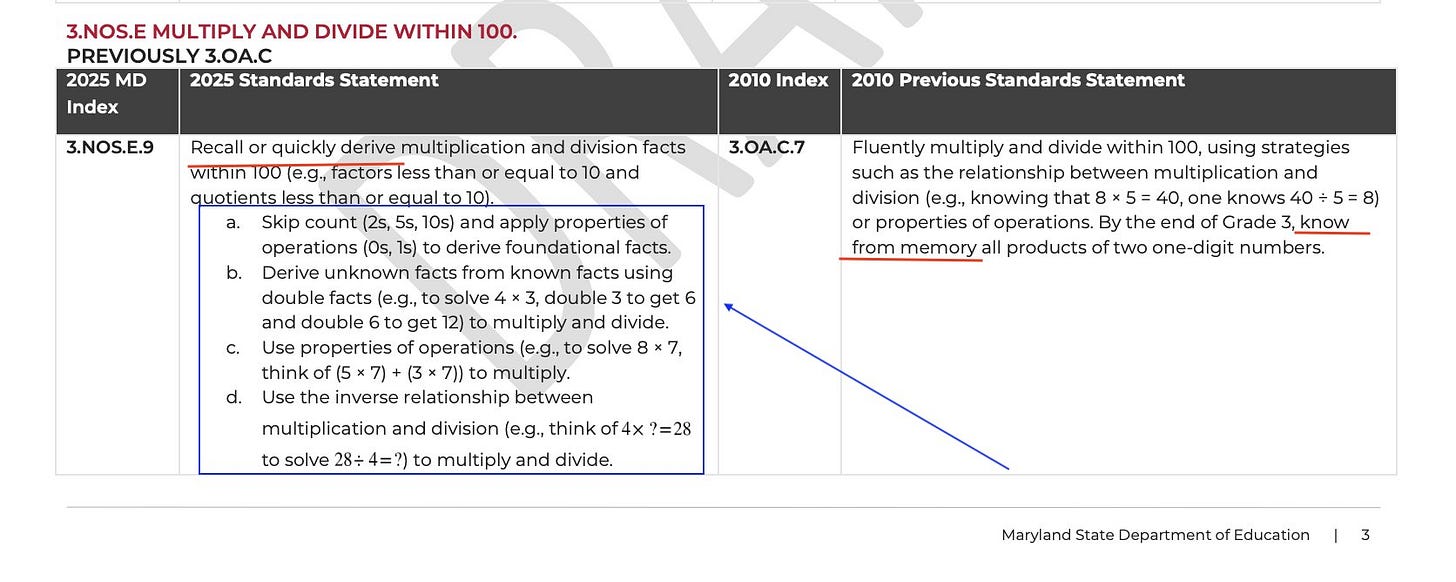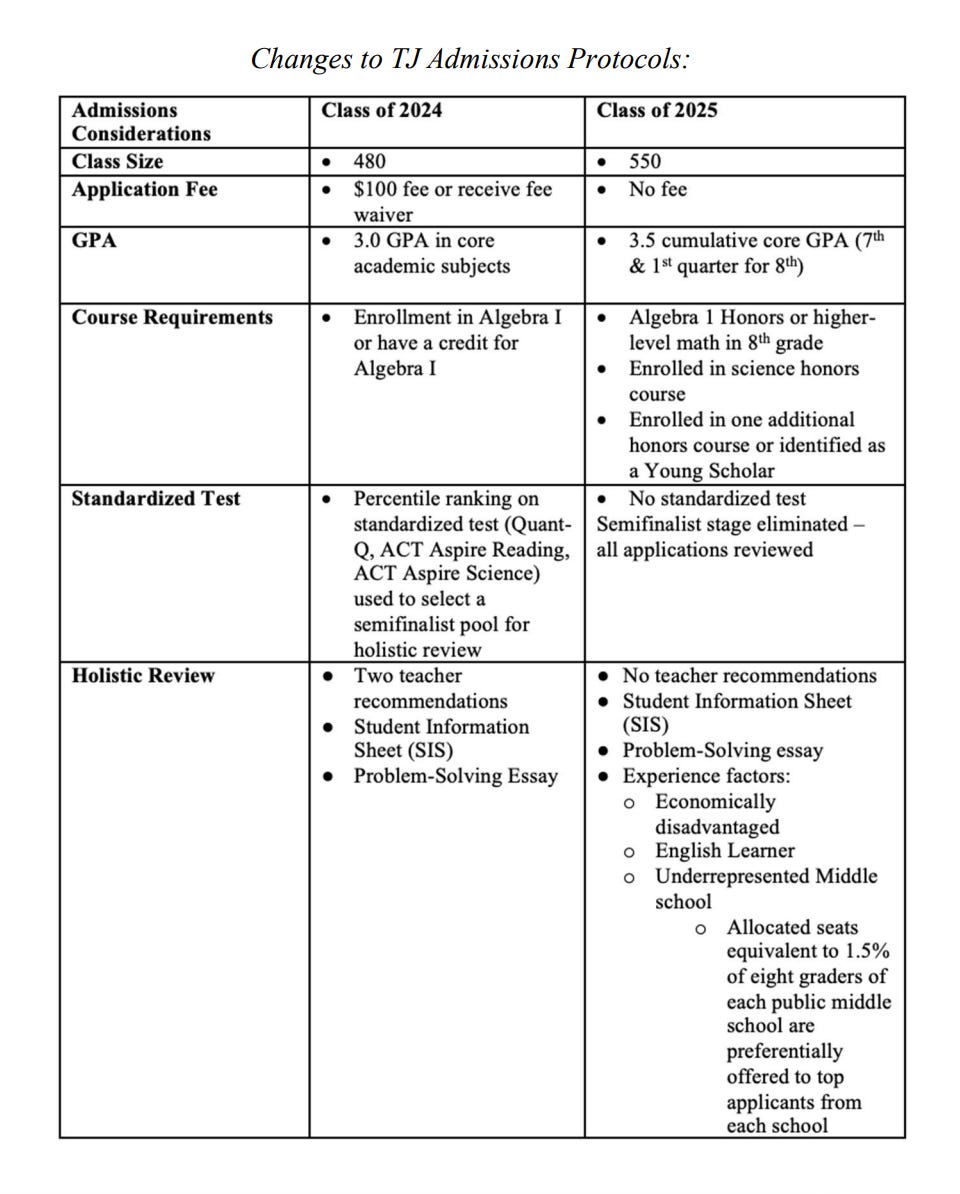Attacks on Excellence: The Summer 2025 Roundup
Turning up the heat while school is out | Issue #2
Welcome to the Summer 2025 issue of the Attacks on Excellence newsletter. In issues like this one you can find a roundup of recent submissions from our readers, community, and staff. Sometimes we publish case studies and do deeper dives into specific stories that catch our eye, like the last issue on education policy in New York. As always, thank you to all our subscribers for your support!
From across the United States…
Education reform in New York City under Mayor Mamdani
The Democratic nominee for the upcoming New York City mayoral race, Zohran Mamdani, continues to endorse a controversial and misguided set of education policy proposals from 2019. The “Making the Grade II” report, authored by the School Diversity Advisory Group, includes a broad range of anti-excellence policy recommendations. Notable hits include gutting the Specialized Schools, phasing out the gifted and talented programs, and prohibiting screening tests for competitive middle school admissions.
For more on Mamdani’s vision for NYC education, check out Amy Zimmer’s great reporting in Chalkbeat.
Regent Exams are no longer a graduation requirement in New York, and their replacement remains vague
Alex Zimmerman reports for Chalkbeat on the elimination of the New York State Regent Exams as high school graduation requirements, and the adoption of their replacement — the “Portrait of a Graduate” framework — by the Board of Regents earlier this year.
A presentation to the Board of Regents last month, which you can find here, outlines the vision for the Portrait framework. Beyond the mandatory mentions of academic preparedness and critical thinking, the Portrait framework presumably also aims to evaluate students on the other qualities it deems essential, like their creative innovation, effective communication, global citizenship, and reflectiveness and future-orientedness. These kinds of standards seem unworkably vague, and New York education officials must quickly figure out exactly what the standards will mean for all the students about to be judged accordingly.
Maryland’s mediocre new math standards
Maryland’s new math standards no longer require students to memorize their times tables, contra years of cognitive science research and Ed Department policy that recognizes the benefits of memorization for learning math.
Alternative methods for basic math, according to MD. From Todd Truitt’s thread on X.
Read Todd Truitt’s great thread on X about the adopted changes and how they deviate from well-established research and federal education policy.
“Holistic admissions” continue at Thomas Jefferson High School for Science and Technology (TJHSST) in Northern Virginia, and Trump’s Ed Department is looking into it
TJHSST still uses a “holistic” review to evaluate students whose applications demonstrate “enhanced merit.” Unfortunately, so far this holistic reforming of the admissions process has predictably and ironically eliminated the most equitable measure of merit available to ultracompetitive magnet schools like TJ: standardized tests. The chart below, from 2022, still paints an accurate picture of the kinds of admissions reforms that have been adopted by the Fairfax County School Board (FCSB):
From p. 1113 of Janel A. George’s 2022 article in the Fordham Urban Law Review.
These changes were adopted in October 2020 in large part to address an outcry over racial gaps in admissions at TJ, particularly for Black students. But FCPB’s efforts to indirectly racially re-balance admissions have resulted in legal challenge after legal challenge. Despite a 2023 win in the Fourth Circuit in a case brought by a group called Coalition for TJ, in May FCPS was accused by Virginia Attorney General Jason Miyares of intentionally discriminating against Asian applicants in the admissions process.
An investigation from Trump’s Education Department quickly followed suit, though Fairfax County Public School officials, TJHSST staff, and potential TJ families will have to wait like the rest of us to see how this investigation and potential litigation pan out. Given the drastic personnel cuts that have occurred at ED’s Office for Civil Rights, everyone might be stuck waiting for a while. The Legal Defense Fund has penned a statement in support of the admissions policies that you can read here.
A Washington, D.C. kindergarten rug pull?
D.C. Public Schools caused confusion and concern among a number of families with kindergarten-age children this year when it abruptly changed policies concerning age cutoffs and delayed first-grade enrollment in its kindergarten programs. These policies include “redshirting” — letting some kids with birthdays close to the cutoff stay in kindergarten for another year — as well as medical exception policies regarding developmental delays and related circumstances.
D.C.’s recent attempts to fix the problem just seem to have provoked more confusion among parents. This Reddit thread offers some interesting differing views.
Undermining the Tulsa Honors College
Since 2023, Jennifer Frey has been the inaugural dean of the University of Tulsa’s Honors College, but after several successful years she has been told by university administrators that the Honors College must “go in a different direction.” More specifically, this “different direction” means eliminating the entire dean’s office, staff positions, and many of its distinctive programs. This change is a huge loss for the University of Tulsa and the Oklahoma higher education system more broadly.
What caused this change? In Frey’s words:
The stated reason for these cuts was to save money — the same reason the University of Tulsa gave in 2019 when it targeted many of the same traditional forms of liberal learning for elimination. Back then, the administration attempted to turn the university into a vocational school. Those efforts largely failed, in part because of lack of student support for the new model.
Frey also had an informative and stirring thread on X about what happened to her honors program.
Federal mishaps
Trump’s Ed Department is still flushing national education data away
National education data-collecting and -reporting practices continue to suffer from misguided attempts at reforming the Department of Education. Since Elon’s departure it has been somewhat unclear where a DOGE priority might be ending and where a new policy might be beginning, and the Education Department has been no stranger to such uncertainty this year. Budgetary and personnel cuts were quick to affect institutions responsible for collecting and reporting national education data, like the Society for Research on Educational Effectiveness (SREE) and the American Educational Research Association (AERA), and now many crucial studies and yearly reports on student performance and instructional progress are being cut or significantly drawn back.
For more information on how the federal government facilitates student data collection, check out this EdFacts info sheet. This piece dives into how the new budget will affect education research by slashing funding for the Institute of Education Sciences. EdWeek also provided an overview of which organizations’ contracts with ED were cut by DOGE. Finally, follow Jill Barshay and subscribe to her Proof Points newsletter if you want to stay up to date about the state of the Education Department and federal education research.
Widespread federal funding uncertainty for public school programs
This year has seen the Trump administration go back, and forth, and back and forth again on releasing funds Congress put aside for trainings, after school activities, and all sorts of other programs that public schools across the country have implemented in the wake of Covid-19. Cuts have included funds for top STEM teachers, after school programs of all sorts, and extra instruction for struggling students. Thankfully the latest chapter in this story is looking positive, as most of the roughly seven billion dollars of the funding is apparently going to be released.
Unsurprisingly, playing political football with such large amounts of federal funding has resulted in a tsunami of budgetary and regulatory confusion in the schools and among their officials and administrators. The problem is twice as thorny after the Covid-19 pandemic, though, because schools have since leaned on more robust federal dollars to expand personnel, soften pay and budget gaps, and offer ambitious new programs and services. Nearly a third of the nation’s roughly 14,000 school districts ran a deficit last year. Neat trims and non-disruptive reductions will be hard to come by as schools navigate future budgetary uncertainty.
Big changes, bigger uncertainties
When bad facts become sweeping new law
Someone in the Montgomery County Public School (MCPS) system messed up, because Mahmoud v. Taylor should have never reached the Supreme Court.
But it did, and now it is anyone’s guess how school, district, and statewide policies will begin to take shape under an expansive new understanding of the parental right to withdraw a child from public school lessons that conflict with the family’s religious practices. Where MCPS saw reasonable LGBTQ+ inclusive reading materials for K-5th-graders, enough Maryland parents and six Supreme Court Justices saw a bit more. You can find excerpts from the books on page 42 of the Supreme Court’s opinion and judge the content for yourself.
Mahmoud v. Taylor is a quintessential example of today’s public school culture wars: stubborn insistence on obviously controversial materials on the one hand, and predictable backlash from families with different expectations on the other. Or it’s a battle between reasonable methods of inclusion and small amounts of magnified outrage, depending on your priors.
To read more about the decision, check out this piece from the Brookings Institution, or this article from Chalkbeat. The Advisory Opinions podcast also had an excellent episode where Sarah Isgur and David French discussed the case, which you can find here.
The One Big Beautiful Bill, and many more school vouchers
With the Trump administration’s signature budget bill comes the country’s largest piece of school choice legislation in history, and with that a coming wave of new vouchers now for private schools as well. Under the program, donors can give up to $1,700 to qualifying scholarship nonprofits — which are now easier than ever to create — and earn a tax credit matching their donation. The program is less muscular than it had been in the initial House bill; now an “opt-in” program, many blue states are expected to sit out (despite support from some Democrats), and the $1,700 donation limit required to filibuster-proof the bill was disappointing to school-choice advocates. Nonetheless, the provision marks a major win for voucher proponents, and an opportunity to test a particularly ambitious and risky version of their plan to make schools compete for students.
Read more from Neal Morton at the Hechinger Report here.
How workable will Trump’s new anti-DEI guidance be?
On July 29, the Department of Justice released a new Memorandum — “Guidance for Recipients of Federal Funding Regarding Unlawful Discrimination” — that describes what types of DEI policies might expose institutions to legal liability. Preferential treatment according to categories like race, gender, and nationality will presumably risk being challenged in court, as will using those characteristics or any of their proxies in hiring, admissions, and the like. Wiley Law has a great summary of the Memorandum that you can read here.
The big problem for educational institutions — especially elite ones — is the past decade’s worth of evidence of their policies and practices often straightforwardly violating plain readings of civil rights laws.
Private lawsuits will likely be an entirely different beast for higher education, and they’re already starting to appear at elite schools like Cornell. Reporting from the Manhattan Institute has created a pretty solid case that “DEI policies,” or whatever they should be called, often went too far in too many places.
The SAT’s radically short approach to testing reading
The reading comprehension questions are going to be way shorter (think more in the ballpark of 100 words, rather than the previous ~700), and the optional essay is gone, according to two of the College Board’s new manuals. The policy director for a competitor test, the Classic Learning Test, has interesting things to say on the changes.
Submit a report
That’s all for this summer roundup edition of Attacks on Excellence. You can help the Center for Educational Progress identify the forces holding students back, as we build a record of the policies, practices, and personnel that deserve broader attention. Tune in next time!
Submit an anonymous report [here] or email centerforedprogress@gmail.com (subject: Attack on Excellence)






Excellent summary of the current issues with the U.S. educational system.